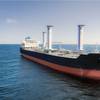Decade Old India Shipping Summit Makes History
In ten years, India Shipping Summit held consistently in Mumbai, has sailed on a robust growth course despite the worldwide witnessing recessionary waves buffeting any endeavors to grow and gain. The reasons are not too far to see. From the very beginning it has been reputed to be a mega event of South East Asia. It sought consistently to bring government representatives and the leading lights of the industry on to a common platform thus acting as a beacon for the country’s maritime trade to move on the road to progress. It has continued to garner support from every section of the trade and industry each time the event has taken place.
This year the three-day event held last week brought together a bigger gathering of shipping elites and the who’s who in the industry. The support received this year was indeed overwhelming and the issues deliberated were the very topics that have for long continued to foment an unsettling effect on the industry – topics such as ship recycling, snail pace infrastructure growth, ship owning, stagnant shipping tonnage, ship manning and ship management and the like. But at the end of it all the large number of participants who stayed put throughout the various sessions evidently indicated that they were set on getting their problems straightened out through networking, panel discussions and in the Q/A after each session.
There were some outstanding issues that came into focus. Ship owners noted that the market dynamics had undergone a drastic change. There was a big boom in the offshore sector with E & P going on at an unprecedented scale. Many discoveries and the subsequent oil production were helping to increase availability. Shipowners see the offshore as the sunshine sector. The production of shale gas is also helping to set the trade on fire. The US, which has been importing oil, was turning out to be an exporter of energy.
The price of oil has been tumbling by the day and the tankers trade was seeing an upheaval. Though gas tankers demand has been strong it is hoped that for product tankers it remains steady. With the number of refineries increasing in South Asia along with capacity building being taken on fast track the trade would see a drastic change in time to come.
Yudhishthir Khatau, Chairman & M.D. of Varun Shipping Co. Ltd. presented a business model that could see Indian shipping out of the downturn. Umesh Grover CEO of Indian National Shipowners’ Association pointed out that the Indian fleet had not caught up with the country’s growth and only 9 per cent of the India’s International trade was carried by Indian flag ships owing to 13 taxes play spoil sport. He desired that the various concerned Union government ministries need to come together to sort out the issues hurting the industry.
There was skilled manpower shortage as was pointed out by G Shivakumar, Group CFO of Great Eastern Shipping Co. Ship building activity was also affected as a result of this. Taking a holistic view Kaushik Kuchroo, President of Mercator Ltd., agreed on this point saying, “Good manpower was going to foreign shipping lines. There is a need to look at short term measure. Unless we make a concerted effort to tackle the situation the limited tonnage problem will not change.”
With regards India’s seaborne trade session there was a general consensus that tanker trade picked up because there was assurance of cargo as a result of which ship owners could approach the banks and get financial support and go in for more ships. Some of the Indian ship owners wanted cargo guarantee which could in turn help to kick start growth in Indian shipping tonnage.
When it came to ship recycling, Indian recyclers did not see an alternative to beaching method which has since recently been considered to be environment friendly, cheapest mode of recycling and most efficient. Nitin Kanakiya, Honorary Secretary of Ship Recycling Industries Association viewed this industry akin to that of a steel plant production. “We have put in place several environmental protection measures at Alang, where the world’s biggest ship breaking activity goes on. We have made prevention of gas emission mandatory, providing regular medical checks and insurance cover to the workers, besides training and other benefits. Some of the yards have secured ISO certification including ISO 9001, 14001, 18001 & 30,000. The ship breakers in India were already putting in place various measures required under the Hong Kong convention.”
The reason for EU coming up with their own guidelines when Hong Kong convention still remained to be ratified seemed to be strange. Most ship breakers did not see justification as it amounted to breaking off from IMO. It was pointed out that EU is insisting on dry method and opposed beaching method which was not so with the Hong Kong convention. It seemed strange that EU countries did not have sufficient yards to handle their ship breaking activities and elsewhere too there was not sufficient capacity to do by the dry method.
Retaining quality manpower was a major issue that came into focus in the Ship Manager forum. Getting the floating staff interested in their job and creating a good congenial and attractive atmosphere for them to operate was seen to be an important factor. Kishore Rajvanshy, M.D. of Fleet Shipmanagement Ltd., pointed out that it takes 7 to 8 years for a cadet to rise up to become a captain whereas it takes just 8 months to one year to convert steel into a ship. There was need to stop attrition.
Capt Rajesh Deshwal, CEO of Doehle Danautics India Pvt Ltd., expressed his short presentation with a slogan, “We cannot agree to seafarers leaving the sea. We need to keep them more engaged in their work and keep them motivated. Remember to keep them happy and keep them committed.”
Mr Rajaish Bajpaee, CEO of Bernhard Schulte Shipmanagement gave historical background of the ship management and how it evolved. He pointed out that their industry was so fragmented that there was no industry leader. The owner v/s ship manager status has not undergone a change. There were more and more demands coming in from regulators, ship owners, insurance and other related agencies. “I am seeing a new breed of investor coming in,” he said. “Maritime training needs to be aligned with what the industry was facing.”
To sum it up India has all the ingredients to grow. Good manpower, professional banking system, skilled professionals, etc. Indian owners abroad can also participate in the India’s growth. It is time to learn from other economies which have succeeded. The secret is that India can do it.













